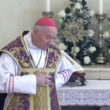I love mountains. I was born in the foothills of the Austrian Alps, and grew up in the shadow of the rocky mountains. Mountains have an uplifting quality about them. Strange as it sounds, I want to say they are necessary for the soul to breathe: they allow the psyche to expand. Perhaps this is not surprising given the body-soul composite which is man. Perhaps Saint Benedict’s gentle and large-souled spirit was partly due to his youth in the hill country of Italy. With feasts in March and July, I nonetheless feel every day is a good day to ask him for the gift of Benedictine magnanimity (and perhaps a mountain hike).
“Fuit vir” begins St Gregory the Great’s Life of St Benedict: “There was a man of venerable life, blessed by grace, and blessed in name—for he was called Benedictus.” Gregory tells us that “he was born in the province of Nursia, of honorable parentage” and that date is usually put at around 480. Nursia (or Norcia) is a small mountain town in the central Italian province of Umbria. Umbria! What a delightful word, warm and round, filled with Mediterranean warmth and alpine briskness. Norcia is nestled among high hills and mountains, over which mists and clouds often roll. The landscape must not have changed much since Benedict’s youth. Traces of human activity in Norcia date back to the late stone age: settled by the Sabines in the 5th century BC, and eventually became a Roman town: the mother of Emperor Vespasian was born there around 15 BC.
Saint Benedict, then, was a mountain man of sorts: born in them, he lived in them for most of his life, as he first embraced the eremitic life on the side of a cliff in Subiaco before founding the great monastery of Monte Cassino on… a mountain! As grace works with nature, it might not be going too far to suggest that this continual experience of mountain vistas contributed, in some way, to the spiritual magnanimity and breadth of vision which penetrates his Rule.
In the popular Catholic imagination, the Benedictine Rule often gets a bit of a bad rap for being very strict: in particular, St Benedict’s admonition to whip the young boys who would have been in the monastic school is brought up. Yet the Rule is not only quite gentle compared with other monastic rules: it is imbued with moderation and sensitivity for the human person. You just have to look closely—and most people don’t.
For example, one of the overarching principles of the Rule is that the Abbot should be a man of such discretion that he can always adjust and temper the letter of the Rule in favor of particular situations and weakness of brothers. The principle is that “the strong should always have something to strive after and the weak nothing to take fright at.” St Benedict is very clear that this is not so that vices may grow up in the community, but “that souls may be saved.”
“Listen, my son, to your master’s precepts, and incline the ear of your heart.” From the first sentence of the Rule, St Benedict reveals himself as strong, authoritative, understanding, and gentle: there is no unhelpful hyperbole all too often found in other spiritual authors, no manipulative grasp for power all too often found in superiors. Straightforwardly, St Benedict sets forth the situation of the Christian soul desiring to do “good work,” admonishing us to “open our eyes to the deifying light” and encouraging us to “run while you have the light of life.”
This mountain man’s opening question is as fundamental as it is easy to answer: “Who is the man who will have life, and desires to see good days?” To this response we all reply, “I am he” and then the saint details what the monastic course to this “life” looks like. It is a path that the “sweet voice” of the Lord “shows in his loving kindness,” first of all the path of the Gospel and secondly that of the evangelical counsels. For the practice of these latter, Benedict establishes “a school of the Lord’s service,” the monastic community, in the founding of which he hopes “to introduce nothing harsh or burdensome.” Yet he does expect a certain strictness to be inevitable since the way of salvation cannot but be narrow. For St Benedict, it is by advancing in the spiritual life that “our hearts expand and we run the way of God’s commandments with unspeakable sweetness of love,” on our way to the father’s Kingdom.
I have wondered what a Rule for Laity would look like coming from the pen of St Benedict. I would love to see one, for many years of meditation on his Rule for Monasteries is one which imbues my impression of St Benedict with an aura of gentle fatherliness. He does not strike me as the sort of patristic father to pour out diatribes against marriage like St Jerome. And yet, I also wonder if Benedict would say much that was different to the laity as he would to his monks. Certainly, the practice of laymen and women becoming Oblates is as ancient as it is hallowed by the important figures who counted themselves oblates: St Thomas More, Dorothy Day, Jacques and Raissa Maritain, Walker Percy, and Rumer Godden were all oblates, to name a few. Essentially, the lay Oblate lives out their state in life informed and nourished by Benedictine principles and spirit of approaching life.
Meditation on fundamental principles of the Rule reveals several gems of value for the monk, spouse, or single alike. St Benedict concludes his list of seventy-two recommended “good works” with the reminder that in case you were feeling overwhelmed by admonitions to “keep death daily before one’s eyes,” the bottom line really is “never to despair of God’s mercy.” When it comes to humility and acknowledging one’s passions, this Roman reminds us to approach God with the statement-prayer of “every desire of mine is before You.” Speaking of the material administration of the monastery, St Benedict is eager that adequate assistance be given to every monk in their assigned tasks so that “no one may be troubled or vexed in the house of God.” This advice and principle is repeated several times throughout the Rule, along with the recognition that just cause for complaints could arise if it was ignored: this is presumably based on life experience!
At the end of the day, St Benedict’s wide-souled Rule should encourage us not only to pray in the mountains, but to reassess our ideas about asceticism and virtue. While he does emphasize specifically monastic understandings of obedience and humility, St Benedict’s acknowledgement that the spiritual life is inevitably difficult but must not be made more so by our stupidity or pride in trying to do too much work or penance is a good reminder for all over-achievers.
The fundamental desire to “seek” and “serve God” can become a fruitful reflection on one’s own spiritual journey. Not only in our treatment of others, but also in our treatment of ourselves is it helpful to remember that if we scrub the rust off too enthusiastically, we may break the whole vessel: as with the Abbot, as we said we should “temper all things that the strong may have something to strive after, and the weak may not fall back in dismay.” These, and nearly all his comments on the Abbot seem like perfect instructions for spouses as well as spiritual superiors. St Benedict, the author of a “rule for beginners” as he himself calls it, should be invoked as a large-souled and gentle mountain man; someone who knew that he was here to seek and serve, and not make his or anyone else’s life unnecessarily difficult. After all, it should not trouble us if we do not achieve more than “some degree of virtue and the rudiments of the religious life,” as it was his hope the Rule would instill.
Photo by Massimiliano Morosinotto on Unsplash















